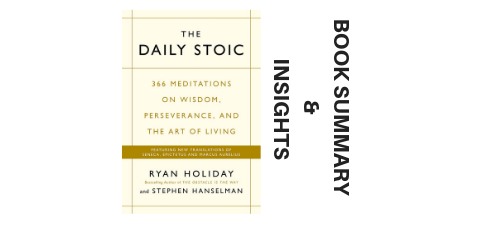The Daily Stoic (2016) Book Summary & Insights
Book title: The Daily Stoic
Subtitle: 366 Meditations on Wisdom, Perseverance, and the Art of Living
Publication date: 2016
Author names: Ryan Holiday & Stephen Hanselman
About The Authors
Ryan Holiday is the best-selling author of Trust Me, I’m Lying; the Obstacle Is the Way; Ego, Is the Enemy; Conspiracy and other books about marketing, culture, and the human condition. His work has been translated into over thirty languages and has appeared everywhere from the New York Times to Fast Company. His company, Brass Check, has advised brands such as Google, TASER, and Complex, and multi-platinum musicians and some of the biggest authors in the world. He lives in Austin, Texas.
Stephen Hanselman has worked for over three decades in publishing as a bookseller, publisher and literary agent. He is a graduate of Harvard Divinity School where he received a master’s degree while also studying extensively in Harvard’s philosophy department. He lives with his family in South Orange, New Jersey.
Book Summary
This book is about the practical application of the ancient philosophy of stoicism to modern day living.
Who Is This Book For?
It’s for pseudo-philosophers who do not understand the tenets of philosophy, and for every other person who wishes to live a life beyond the realm of materialism.
Buy Book: Support The Book Authors And Our Work
Great books should be read, studied, and reviewed frequently, so reading the actual book may provide more value to you than the book insights on this page. Besides, this would support the work of the book author and what we do on LarnEdu. What could be better?
Important Notes
We get a small compensation from Amazon when you visit your nearest/local Amazon site via our affiliate link to purchase an item within 24 hours or if you add it to your cart and checkout within 90 days. This is no additional cost to you and supports our work.
The information on this page is meant to supplement the actual book(it is not a book review but distils the key insights or ideas from the book in under 5000 words). The content creator or LarnEdu does not necessarily support the views, thoughts, and opinions expressed in the text/book. Reasonable skepticism should be applied with any views, thoughts or opinions expressed/shared by the book author or content creator.
Reading the contents of this page does not guarantee specific results. The best lessons are achieved from taking consistent action in the real world rather than being addicted to the illusion of progress by getting stuck on reading an infinite amount of books or book summaries and insights. LarnEdu and the content creator accepts no responsibility or liability for the accuracy of the information on this page or how it is used.
Introduction

Sometimes, life can be exhausting that it might be hard to find meaning in our daily struggles or suffering. We look for a guide or answers to make life’s journey more bearable only to realise those around us feel the same way. It can be very hard to be inspired or strive to make an impact in the world in situations like this. But there is an answer. And as many things; the Greeks figured this first.
There have been schools of philosophy for almost 2500 years. But most of these philosophies concerned themselves with unnecessary questions that added no value to the ordinary man’s life until stoicism came into the picture.
The little we know about stoicism is based on texts that survived, written by three great intellectuals who were knowledgeable about the ancient Greek theories. And these texts were;
- The contemplative writings of the Roman Emperor Marcus Aurelius
- The private correspondence of Seneca the Younger
- The handbooks of the former slave and teacher Epictetus
Book Insights
Stoics develop a critical perception of themselves and others
We often imagine philosophy to be a dreary road threaded by nerds or people who have “one or two screws loose”. But this is not stoicism. Stoicism as a philosophy applies to modern living, and a fundamental element of being a stoic is to be self-critical. Stoics understand most people are not as intelligent and self-aware as they would like to think which is why it is important to remain humble and critical of our thinking and actions.
You must not be afraid to tell yourself the truth even if it hurts. It teaches you to discard your preconditioned bias and ask yourself the questions friends or family members are not willing to ask you. This is what Epictetus meant when he said we should question our emotions and belief, to drop our egos by the roadside and stop deceiving ourselves. Rather than live in an illusion, we need to wake up and take the red pill to see how far the rabbit hole goes.
Putting yourself under the microscope to brutally expose your faults might seem like a disadvantage to those who think the world of themselves. To reduce yourself to nothing, in order to gain something – in this case wisdom, is not an easy thing to do although it’s one of the best things to do.
Taking a critical perspective on ourselves also means “staying woke” by being aware of the people around you and deciding to avoid those that don‘t work towards your greater good. It is not for nothing that it is said; “show me your friends and I’ll tell you who you are”. This is applicable as a stoic because we are the sum total of the people we spend our time with. If you hang around people who do hard drugs, you’re more likely to be influenced by them to take hard drugs.
Hone Your Mind Like A Sword And It Will Cut Through Any Distraction
The amount of information available at our fingertips is overwhelming. With social media and the internet, we have so many weapons of “mass distraction”, no wonder we get so easily diverted from our true purpose. While we may not have control over the distractions surrounding us, we can discipline our minds to stay on course and not be distracted. We need to filter out noises and focus on what is truly important to moving our lives forward.
We must always consider each step we take, and not be driven by passion, or irrationality. Impulse action – just like impulse spending, is detrimental to your goal of self-discovery. This was practiced by Cato – a rival of Júlio César, who chose to speak only when his words had value. By being in control of your mind, you can bring more tranquillity to your thoughts. It is good to think before you take action, but it is also important you take action.
Because our lives are filled with clutter, there is a tendency for us to prioritise the wrong things. Only by having clear goals are we going to rise above the obstacles holding us back in life.
Prepare For Everything; Expect Nothing
As a Stoic, you have to always prepare for every eventuality. It’s been said that “a man who doesn’t expect anything, is never disappointed.” This is the bedrock of a Stoic. They know life turns on a dime, and even best friends can disappoint them at the critical hour. This is why they are three chess moves ahead of the next player. They plan for every eventuality and crush unforeseen troubles with ease. Unforeseen for the ordinary man, but seen by the Stoic miles away. Figure out techniques to strengthen the resilience of your mind. Be adaptive and proactive to changing circumstances, and not reactive. The moment you react to events as they unfold, you’ve lost control. You must be ready to seize the day and have the state of mind to see an opportunity in a hopeless cause by being “in the moment” and staying ready. Another quality a stoic has, is the ability to let go of things which do not help them achieve their life’s objectives. It could be friends, family, or a bad lifestyle. Once you are self-critical, you will identify these garbage that has turned you into a refuse dump. Dump them without a second thought and move forward. Think and act like a speeding bullet which does not relent until it hits its mark.
Control Your Emotions
Emotions or reactions such as joy, pleasure, trust, disgust, surprise, sadness or anger are highly influenced by our biases
Stoics understand this and always act not based on feelings or emotions but by intelligence or rationality.
For example, a stoic would likely stay calm and not respond with anger when insulted.
Keep Your Eye On The Ball; Do Whatever It Takes To Achieve Your Goal
This goes along with everything that has been said. Be practical in your choices and cold-blooded in the attainment of your objectives. Making decisions with your heart instead of your head will take you on a journey to nowhere. Play the long-game if need be. You need the foresight and mental clarity to see four, five, and even ten steps ahead. Ancient Chinese Generals were known to lose battles in order to win wars. You do not have to win right now, and as a Stoic, you have to be prepared to take a loss in the present, in other to profit in the future. This reminds me of Jeff Bezos – a master in the art of the long game. Amazon (a company owned by Bezos) is well known to operate on a loss in order to gain market share. The company has sold goods at outrageously ridiculous prices in order to ground the competition into the dust. Once rival companies can no longer compete, they get bought out by Amazon for pennies on the dollar. Now look at where Bezos is today. He is the richest man in the world.
Live Your Life By A Strict Moral Code
Morality has nothing to do with religion and God. Some of the most moral people in the world followed no known religion. The greatest reward for stoicism is the attainment of virtue and this is why you have to live by a strict moral code. The stoic sees through materialism and shuns them. And where materialism is embraced by the stoic, it is used as a means to attain virtue and not the end itself. Virtue is the highest goal one can aspire to; it’s a fusion of justice, honesty, discipline and courage all rolled in one.
There is no purpose to living your life without virtue as a goal. Materialism only leads to more materialism, and that is why many of the richest people in the world are never satisfied or happy. They endure sleepless nights, devising devious schemes to make more money in order to keep themselves on the Forbes rich list. They have made an insane amount of money to get to the top and have to make an insane amount of money to stay there. But the Lamas of Tibet see through this; and that is why they spend most their lives in meditation and prayer. They know the goal is not outwards to conquer the world, but inwards to conquer their minds. But no one will lead you on this journey. Make the concerted effort to get there. Seneca was right in his Moral Letters when he said, “Every noble deed is voluntary.” Only you can do it for yourself and no one else.
The Stoic believes that all men are connected and this guides them in their duty to be beholden to one another. As was succinctly put by Marcus Aurelius in his Meditations, “Working with others is what you’ve been made by nature for.” You are on the ladder to attain virtue but you need not step on the heads of others to get there.
Your Behaviour Or Actions Matters To The Universe
The stoic motto, live according to nature, challenges us to learn how we fit into this ever-expanding universe.
Marcus Aurelius one of the founding fathers of Stoicism saw everything in the universe to be interconnected. He used the analogy of comparing humans to bees living in the same hive. According to him, what is bad for the beehive will be bad for the bees. Conversely, what is bad for the world is bad for humans and vice versa. Therefore, it’s always important to think about the greater good of society first before selfish interests.
Adapt The Fear Of The Unknown As Fuel To Attain Your Goals
It is true that “whatever will be will be” this is fate. “Que Sera”. But as a stoic, you have to let whatever that will be, be what you want. Inevitability should never become a source of fear. You must learn to take advantage of circumstances that are beyond your control. Remember Stoics see an opportunity even in a misfortune. This should be your mind-set. You should strive to appreciate the piquant colours in the rainbow of suffering and embrace it. The ability to embrace suffering is an important step in the attainment of virtue. Mahatma Gandhi used Hunger Strike as a tool in his philosophy of Ahimsa (non-violence). He did this 17 times and his longest fast was for 21 days. Let that sink into your mind, going hungry for three weeks.
Today Mahatma Gandhi is known as the father of present day India.
There Is A Beginning And An End To All Things: Accept It
Homo sapiens have lived on earth 200,000 years. That is a long time isn’t it? But it is doubtful they will outlast their ancestor Homo erectus who lived for 2,000,000 years. They are the most successful man to walk the earth and yet there is no single Homo erectus roaming the earth today. Just like one day, there will be no Homo sapiens walking the earth tomorrow. Everything that has a beginning has an end. Stoicism helps us to come to an acceptance with this end an equanimity with the fact that we’ll die one day. But there are other reasons to embrace death as a Stoic. If passing away really is the end of all things, then we need not fear death because the Grim Reaper brings with him the end of our world’s worries and cares, and the end of death itself because we cannot die twice. Seneca took this a step further by scolding his friends and family when they begged executioners to spare his life. He chastised them for forgetting their philosophical training. From his own perspective, they should have been ready to accept death, same way as he was.
It is interesting to argue different schools of philosophical thought, but stoicism serves a practical function. It is the means by which we can aspire to a more virtuous way of life.
Key Quotes
“God, grant me the serenity to accept the things I cannot change, the courage to change the things I can, and the wisdom to know the difference.”
Ryan Holiday
“Be ruthless to the things that don’t matter, how many have laid waste to your life when you weren’t aware of what you were losing, how much was wasted in pointless grief, foolish joy, greed, desire, and social amusements – how little of your own was left to you. You will realize you are dying before your time!” — Seneca, On the brevity of life, 3.3b
All you need are these: certainty of judgment in the present moment; action for the common good in the present moment; and an attitude of gratitude in the present moment for anything that comes your way.” — Ryan Holiday
Conclusion
Stoicism is not just an academic exercise. It is a practical philosophy propounded by ancient philosophers for contemporary living.
Since You’re Here…
Great books should be read, studied, and reviewed frequently, so reading the actual book may provide more value to you than the book insights on this page. Besides, this would support the work of the book authors and what we do on LarnEdu.
You can also support the work we do at LarnEdu work by making a one/off or monthly donation(via PayPal) for as little as £0.99 or sharing this content.
Do you have any feedback or suggestions? Use the comment section below or send us a message.
Content created by: Chima















